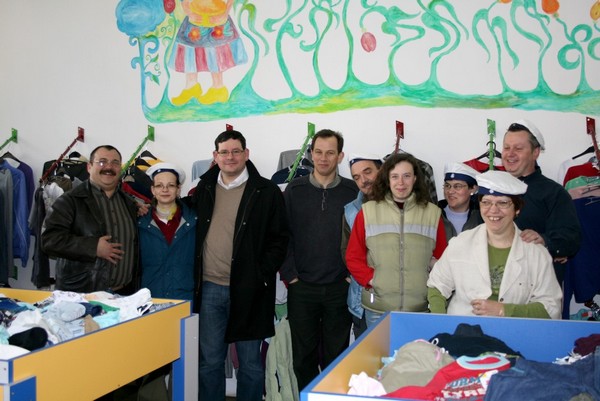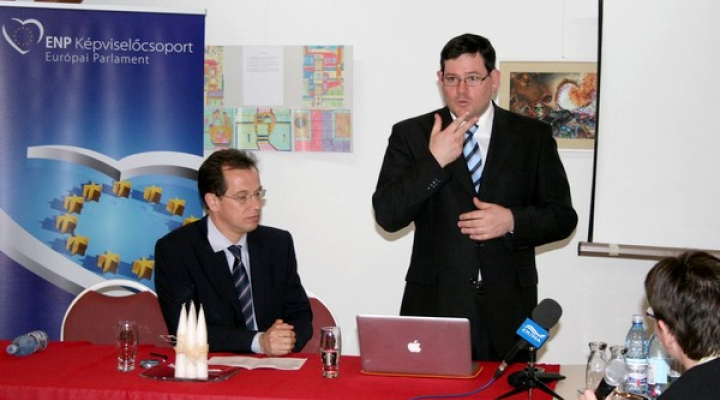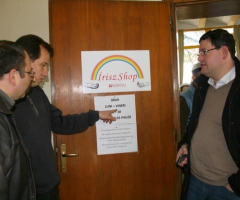European Discussion Nights: policies regarding people with disabilities and employment issues
The series of debates initiated by DAHR’s MEP Csaba Sógor entitled European Discussion Nights continued with new presentations. The guest of the evening was FIDESZ’s MEP Ádám Kósa, who spoke about „New perspectives in the EU’s policy regarding people with disabilities” on the 31st of March in Sf. Gheorghe and on the 1st of April in Cluj.
Ádám Kósa is a specialist in the field of people with disabilities, he himself is the first hearing impaired member in the European Parliament. During his two-day trip to Transylvania, he also managed to visit institutions aiding people with disabilities and to obtain first-hand information about the situation of the social aid system in Romania.
- I started the European Discussion Nights in November last year so that Hungarians in Romania may gain first-hand information about the relevant issues in the EU. This way we can bring the EU closer to the Hungarian community in Romania, and we can present the community to the foreign MEPs who come to make a presentation – said DAHR’s MEP Csaba Sógor in the opening of the latest debate of the series. He also presented Ádám Kósa as a fellow member in the Employment and Social Affairs committee in the EP, where FIDESZ’s MEP deals mostly with employment issues of the disabled.
The audience of Ádám Kósa’s presentations at the Írisz House in Sf. Gheorghe and the Reményik Sándor gallery in Cluj consisted mostly of professionals in the field. Kósa briefly presented the institutions of the EU and the work being done in the EP, and made an account of the changes brought forth by the implementation of the Lisbon Treaty with regard to people with disabilities. He said that the Lisbon Treaty brings the European Charter for Fundamental Rights in primary European law, so it guarantees the prohibition of any form or discrimination based on disabilities or genetic characteristics, as well as the right of people with disabilities to obtain the necessary social integration for employment and to adequate work conditions in terms of accessibility. Kósa stressed, that this is an issue in all member states. The European Commission intends to enact its European Accessibility Package in 2013 that would provide the framework for the free movement of the handicapped.
The MEP presented a series of statistics, saying that more than 80 million people with disabilities live in the EU. Out of this, 40% have a job. The situation is worse in Hungary, where only 10% of the disabled are employed, while in Romania only about 3-4 of them have a job. „This large difference between member states is due to the fact that social policy is a national competence, the EU only shows the direction, but it is the member states that decide” – said the Hungarian MEP. He emphasized how important it is for society to treat the situation of people with disabilities with empathy, to aid them in their social integration, but also how crucial it is, that these persons have a chance to obtain an education and professional training. Continuing this idea, MEP Csaba Sógor said that the Romanian budget for employment, education and health issues needs to grow, and long-term strategies are needed in order to make the disabled full members of society. The Hungarian MEP from Transylvania stressed that it is in the interest of the state to aid the handicapped, both financially and with access to education, so it provides not only social care, but helps people with disabilities to become part of the labor market. Csaba Sógor believes that provision of minority rights is somewhat similar, because these can aid the state not only in security, but economic matters as well. Ádám Kósa added that disabled members of the Hungarian minority in Romania need the opportunity to study in their mother tongue secured. This is only provided for hearing impaired children in Cluj, while the others lack the possibility to obtain a proper education.

Ádám Kósa’s two-day visit to Transylvania included a visit to the Székely-Pótsa Rehabilitation Center in Chilieni, Covasna County. He also visited the development and therapy centre in the Diakonia Christian Foundation’s Írisz House, the only institution in the region that provides employment for young people living with disabilities. The MEP was welcomed by the center’s coordinator, Péter Makkai, who also presented the foundation’s almost finished gardening project in Valea Crişului that also provides jobs for the handicapped, as well as their already functional second hand clothes store.
The MEP’s program also included a visit to the Early Development and Rehabilitation Center in Sânmartin, Harghita County, where the leader of the institution, Enikő Sógor, presented the services provided by the center. She said that they care for children who were diagnosed with deviations from the proper functioning of the nervous system and who develop belatedly emotionally, psychologically and physically. They also provide care for and those children who present deficiencies in sight, hearing, speech or conduct. One of their main goals is to prevent learning, behavior and other psychological disorders, to diagnose deviations in the nervous system as soon as possible and to optimize the life of children with disabilities, as well as the life of their families.
FIDESZ’s MEP was also the guest of Csaba Fikó, president of the Association of Handicapped People in Harghita County, so Ádám Kósa visited the association’s sewing workshop and presentation store in Miercurea Ciuc.
- I started the European Discussion Nights in November last year so that Hungarians in Romania may gain first-hand information about the relevant issues in the EU. This way we can bring the EU closer to the Hungarian community in Romania, and we can present the community to the foreign MEPs who come to make a presentation – said DAHR’s MEP Csaba Sógor in the opening of the latest debate of the series. He also presented Ádám Kósa as a fellow member in the Employment and Social Affairs committee in the EP, where FIDESZ’s MEP deals mostly with employment issues of the disabled.
The audience of Ádám Kósa’s presentations at the Írisz House in Sf. Gheorghe and the Reményik Sándor gallery in Cluj consisted mostly of professionals in the field. Kósa briefly presented the institutions of the EU and the work being done in the EP, and made an account of the changes brought forth by the implementation of the Lisbon Treaty with regard to people with disabilities. He said that the Lisbon Treaty brings the European Charter for Fundamental Rights in primary European law, so it guarantees the prohibition of any form or discrimination based on disabilities or genetic characteristics, as well as the right of people with disabilities to obtain the necessary social integration for employment and to adequate work conditions in terms of accessibility. Kósa stressed, that this is an issue in all member states. The European Commission intends to enact its European Accessibility Package in 2013 that would provide the framework for the free movement of the handicapped.
The MEP presented a series of statistics, saying that more than 80 million people with disabilities live in the EU. Out of this, 40% have a job. The situation is worse in Hungary, where only 10% of the disabled are employed, while in Romania only about 3-4 of them have a job. „This large difference between member states is due to the fact that social policy is a national competence, the EU only shows the direction, but it is the member states that decide” – said the Hungarian MEP. He emphasized how important it is for society to treat the situation of people with disabilities with empathy, to aid them in their social integration, but also how crucial it is, that these persons have a chance to obtain an education and professional training. Continuing this idea, MEP Csaba Sógor said that the Romanian budget for employment, education and health issues needs to grow, and long-term strategies are needed in order to make the disabled full members of society. The Hungarian MEP from Transylvania stressed that it is in the interest of the state to aid the handicapped, both financially and with access to education, so it provides not only social care, but helps people with disabilities to become part of the labor market. Csaba Sógor believes that provision of minority rights is somewhat similar, because these can aid the state not only in security, but economic matters as well. Ádám Kósa added that disabled members of the Hungarian minority in Romania need the opportunity to study in their mother tongue secured. This is only provided for hearing impaired children in Cluj, while the others lack the possibility to obtain a proper education.

Ádám Kósa’s two-day visit to Transylvania included a visit to the Székely-Pótsa Rehabilitation Center in Chilieni, Covasna County. He also visited the development and therapy centre in the Diakonia Christian Foundation’s Írisz House, the only institution in the region that provides employment for young people living with disabilities. The MEP was welcomed by the center’s coordinator, Péter Makkai, who also presented the foundation’s almost finished gardening project in Valea Crişului that also provides jobs for the handicapped, as well as their already functional second hand clothes store.
The MEP’s program also included a visit to the Early Development and Rehabilitation Center in Sânmartin, Harghita County, where the leader of the institution, Enikő Sógor, presented the services provided by the center. She said that they care for children who were diagnosed with deviations from the proper functioning of the nervous system and who develop belatedly emotionally, psychologically and physically. They also provide care for and those children who present deficiencies in sight, hearing, speech or conduct. One of their main goals is to prevent learning, behavior and other psychological disorders, to diagnose deviations in the nervous system as soon as possible and to optimize the life of children with disabilities, as well as the life of their families.
FIDESZ’s MEP was also the guest of Csaba Fikó, president of the Association of Handicapped People in Harghita County, so Ádám Kósa visited the association’s sewing workshop and presentation store in Miercurea Ciuc.












